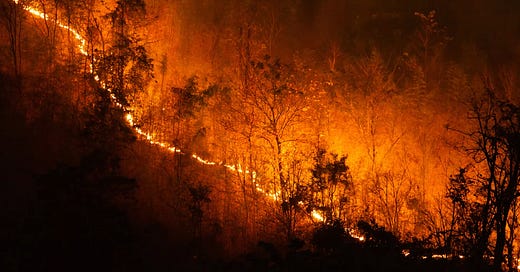I’ve been making a concentrated effort to consume less social media (the smooth, reassuring newspaper-like finish of Substack and promise of longform writing doesn’t count). When I have logged on —let’s face it, we are all addicted on some level—I’ve noticed many people pointing out how much attention is allocated towards the wildfires in California compared to the genocide in Gaza.
I understand the outrage. It’s deeply painful to see the amount of attention, resources and sympathy that are poured into one place, that are suddenly absent when others are hurting for longer, prolonged and sustained periods of time with nowhere near the amount of care. It’s an easy media hit when real estate moguls and celebrities are asking for private firefighters, or Jaime Lee Curtis compares scenes in Los Angeles to “Gaza or some other disaster zone.” It’s insensitive and painful to acknowledge that you know a crisis is happening, but have done virtually nothing about it.
But I think we’re missing the point. These fires—like the genocide in Gaza—are a manmade crisis. While words like “natural disaster” and “wind blown fires” make it seem as if this is entirely an act of God, the fact of the matter is that California has not always been this dry, and the kinds of droughts that dry out the grass and make its terrain so primed for a “natural disaster” such as this one are a direct result of the climate crisis, the inability for privileged people in the western world to prioritize care and compassion for the earth over their need for consumption and convenience. Meanwhile, Gaza is an entirely man-made genocide which could be reversed with the lifting of a blockade or the refusal to send weapons to Israel—but no one seems to have the will to do either of those things.
At least two of my friends have had to evacuate the fires, and neither of them are anything like Keith Wasserman, or any of the other celebrities and multimillionaires who have been forced to flee their homes. They’re ordinary people, packing up their pets and their small families hoping that they can ride out this apocalyptic start to the new year safely. Most of the people are far more like them—and at the end of the day, not so different than the ordinary Palestinian families, who, over the course of the past year, have been forced to evacuate their homes, again and again and again, hoping for the best and preparing for the worst.
Instead, I’m wondering about the ways that we can connect these two crises. For example, how the Los Angeles Fire Department budget was cut by 17 percent, while the Biden administration—and soon the Trump administration—will just keep authorizing military aid to Israel. Even if the same entities are not necessarily at fault, it is a theme that is present throughout these crises. How can we advocate for more public sector funding for fire departments and less defense spending? Many of the firefighters trying to contain the fires are immigrants themselves, forced to be on the frontlines of our crises, while potentially preparing for Trump’s promised mass deportations. How can we honor their service instead of shoving them under the bus? Apparently ICE is conducting raids amidst the wildfires. This feels like a waste of resources. Where is DOGE when you need them?
Jokes aside, I wish we would stop making comparisons, and start making connections, instead. For everyone looking for ways to help those who have been the most affected, here are a few mutual aid funds that will help people in Los Angeles. And here is a list of verified fundraisers to help people in Gaza, as well.
Stay safe,
Anna





